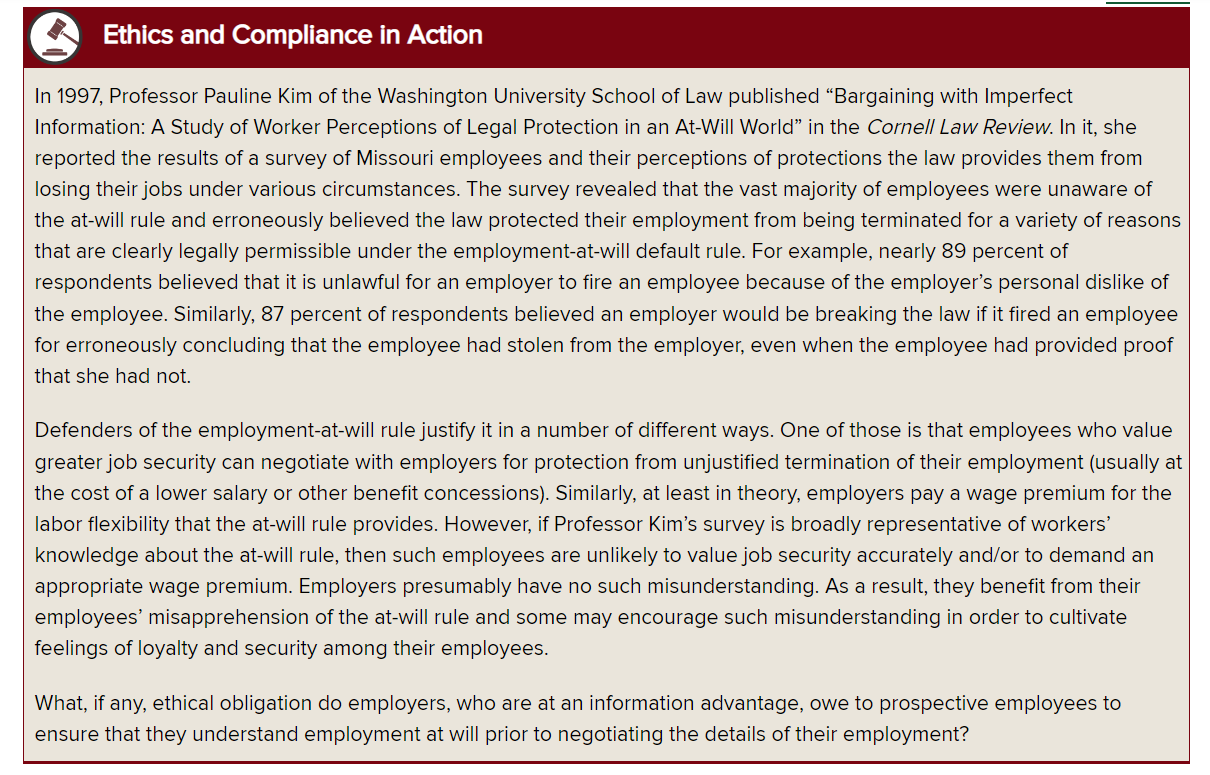Please refer to the Ethics and Compliance in Action article in Chapter 51 page 37. Review this article and answer the questions at the end of the article. Please provide a discussion of the employment at will doctrine, and then discuss the question presented, being sure to answer the question "Why?". It is important that you answer in declarative sentences without using the words "feel, think, and opinion." What, if any, ethical obligation do employers, who are at an infomation advantage, owe to the prospective employees to ensure that they understand employment at will prior to negotiating the details of their employment?
In 1997, Professor Pauline Kim of the Washington University School of Law published "Bargaining with Imperfect Information: A Study of Worker Perceptions of Legal Protection in an At-Will World" in the Cornell Law Review. In it, she reported the results of a survey of Missouri employees and their perceptions of protections the law provides them from losing their jobs under various circumstances. The survey revealed that the vast majority of employees were unaware of the at-will rule and erroneously believed the law protected their employment from being terminated for a variety of reasons that are clearly legally permissible under the employment-at-will default rule. For example, nearly 89 percent of respondents believed that it is unlawful for an employer to fire an employee because of the employers personal dist the employee. Similarly, 87 percent of respondents believed an employer would be breaking the law if it fired an employee for erroneously concluding that the employee had stolen from the employer, even when the employee had provided proof that she had not. Defenders of the employment-at-will rule justify it in a number of different ways. One of those is that employees who value greater job security can negotiate with employers for protection from unjustified termination of their employment (usually a the cost of a lower salary or other benefit concessions). Similarly, at least in theory, employers pay a wage premium for the labor flexibility that the at-will rule provides. However, if Professor Kim's survey is broadly representative of workers' knowledge about the at-will rule, then such employees are unlikely to value job security accurately and/or to demand an appropriate wage premium. Employers presumably have no such misunderstanding. As a result, they benefit from their employees' misapprehension of the at-will rule and some may encourage such misunderstanding in order to cultivate feelings of loyalty and security among their employees. What, if any, ethical obligation do employers, who are at an information advantage, owe to prospective employees to ensure that they understand employment at will prior to negotiating the details of their employment? In 1997, Professor Pauline Kim of the Washington University School of Law published "Bargaining with Imperfect Information: A Study of Worker Perceptions of Legal Protection in an At-Will World" in the Cornell Law Review. In it, she reported the results of a survey of Missouri employees and their perceptions of protections the law provides them from losing their jobs under various circumstances. The survey revealed that the vast majority of employees were unaware of the at-will rule and erroneously believed the law protected their employment from being terminated for a variety of reasons that are clearly legally permissible under the employment-at-will default rule. For example, nearly 89 percent of respondents believed that it is unlawful for an employer to fire an employee because of the employers personal dist the employee. Similarly, 87 percent of respondents believed an employer would be breaking the law if it fired an employee for erroneously concluding that the employee had stolen from the employer, even when the employee had provided proof that she had not. Defenders of the employment-at-will rule justify it in a number of different ways. One of those is that employees who value greater job security can negotiate with employers for protection from unjustified termination of their employment (usually a the cost of a lower salary or other benefit concessions). Similarly, at least in theory, employers pay a wage premium for the labor flexibility that the at-will rule provides. However, if Professor Kim's survey is broadly representative of workers' knowledge about the at-will rule, then such employees are unlikely to value job security accurately and/or to demand an appropriate wage premium. Employers presumably have no such misunderstanding. As a result, they benefit from their employees' misapprehension of the at-will rule and some may encourage such misunderstanding in order to cultivate feelings of loyalty and security among their employees. What, if any, ethical obligation do employers, who are at an information advantage, owe to prospective employees to ensure that they understand employment at will prior to negotiating the details of their employment







